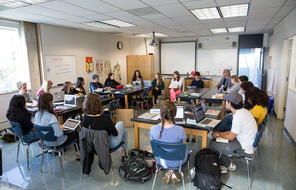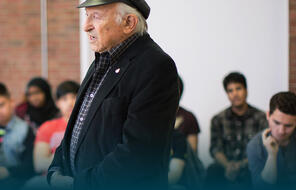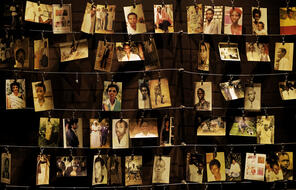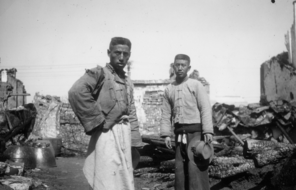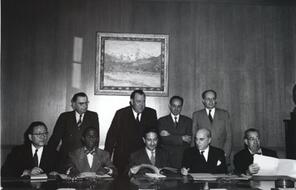What Is Genocide?
Subject
- History
- Social Studies
Language
English — USUpdated
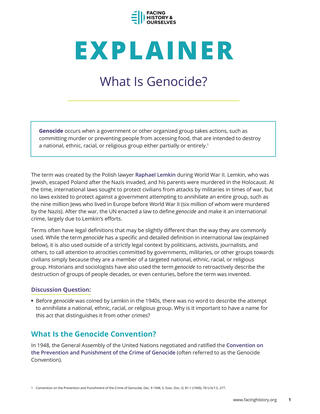
What Is Genocide? Explainer
Download a PDF of this resource for free
Introduction
To commit genocide is to act with the intent to destroy, in whole or in part, a national, ethnic, racial, or religious group. 1 Coined as a moral and legal concept and codified as an international crime in the aftermath of World War II and the Holocaust, genocide is among the most heinous offenses that a government, military, or other organized group can commit.
Since the Convention on the Prevention and Punishment of the Crime of Genocide was ratified by the United Nations Security Council in 1948, genocide and similar atrocities against civilians (such as war crimes and ethnic cleansing) have continued to take place. In the last decade alone, attacks on groups such as the Rohingya in Myanmar, Uyghurs in China, and Armenians in Azerbaijan have been labeled by some human rights groups and governments as genocide.
Since 2022, charges of genocide and genocidal intent have arisen from conflicts that are regularly front-page news and trending stories online, for example, against the state of Russia after its invasion of Ukraine, against Hamas after its October 7 terrorist attacks on Israel, and against the state of Israel after its invasion of Gaza. The legal bar for establishing genocidal intent is difficult to meet, and establishing international consensus about whether genocide is taking place has proven difficult.
Accusations of genocide appear regularly in headlines across the media, though they do not always result in legal proceedings. Students need support in understanding the meaning, gravity, and history of the concept and crime of genocide. This explainer will help students answer the following questions:
- What is genocide?
- What is the Genocide Convention and how is it enforced?
- Who decides if particular actions are genocide?
- Is genocide the only international crime?
What Is Genocide?
Genocide occurs when a government or other organized group takes actions, such as committing murder or preventing people from accessing food, that are intended to destroy a national, ethnic, racial, or religious group either partially or entirely. 2
The term was created by the Polish lawyer Raphael Lemkin during World War II. Lemkin, who was Jewish, escaped Poland after the Nazis invaded, and his parents were murdered in the Holocaust. At the time, international laws sought to protect civilians from attacks by militaries in times of war, but no laws existed to protect against a government attempting to annihilate an entire group, such as the nine million Jews who lived in Europe before World War II (six million of whom were murdered by the Nazis). After the war, the UN enacted a law to define genocide and make it an international crime, largely due to Lemkin’s efforts.
Terms often have legal definitions that may be slightly different than the way they are commonly used. While the term genocide has a specific and detailed definition in international law (explained below), it is also used outside of a strictly legal context by politicians, activists, journalists, and others, to call attention to atrocities committed by governments, militaries, or other groups towards civilians simply because they are a member of a targeted national, ethnic, racial, or religious group. Historians and sociologists have also used the term genocide to retroactively describe the destruction of groups of people decades, or even centuries, before the term was invented.
Discussion Question:
- Before “genocide” was coined by Lemkin in the 1940s, there was no word to describe the attempt to annihilate a national, ethnic, racial, or religious group. Why is it important to have a name for this act that distinguishes it from other crimes?
What Is the Genocide Convention?
In 1948, the General Assembly of the United Nations negotiated and ratified the Convention on the Prevention and Punishment of the Crime of Genocide (often referred to as the Genocide Convention).
The document details the legal definition of genocide:
Any of the following acts committed with intent to destroy, in whole or in part, a national, ethnical, racial or religious group, as such:
- Killing members of the group;
- Causing serious bodily or mental harm to members of the group;
- Deliberately inflicting on the group conditions of life calculated to bring about its physical destruction in whole or in part;
- Imposing measures intended to prevent births within the group;
- Forcibly transferring children of the group to another group.
Two characteristics that make genocide different from other atrocities are the following:
- INTENT: When genocide occurs, the perpetrators not only attack a national, ethnic, racial, or religious group of people, but they also intend to destroy the group as a result of the attacks. According to the UN, the intent of the perpetrator is the hardest part to prove. 3
- TARGETING THE GROUP: When genocide occurs, the perpetrators deliberately attack the victims simply because the victims are members of the targeted national, ethnic, racial, or religious group. Victims are not targeted as individuals, or because of anything they have said or done, but only because they are a member of the targeted group. 4
As of January 2024, 153 countries (of about 195 countries in the world) have ratified the Genocide Convention. According to a 1951 ruling by the International Court of Justice (ICJ), the international law created by the Convention applies even to countries that have not ratified the Convention. 5
Discussion Questions:
- Why do you think the intent of a perpetrator to destroy a national, ethnic, racial, or religious group is difficult to prove? What kind of evidence might investigators use to show intent? What kind of evidence should people have before they use the term outside of legal settings?
- What does it mean to be targeted because one is a member of a group? Why might national, ethnic, racial, and religious groups need specific legal protection?
Who Decides If Particular Actions Are Genocide?
Human rights activists, politicians, and journalists have accused perpetrators, who are committing atrocities, of also committing genocide in order to draw attention to the crimes and pressure the perpetrators to stop. When people use the term genocide in this way, they do not always have evidence that the atrocities meet the legal definition of the crime.
However, to determine whether or not the international laws established by the Genocide Convention have been broken, national or international courts must weigh the evidence and apply the Convention’s definition. The national court of the country where atrocities occurred has the first opportunity to determine whether the actions were genocide and prosecute the perpetrators. If the national court is unable or unwilling to take action, then either the International Court of Justice or the International Criminal Court can consider the evidence and issue a ruling. 6
Under the Genocide Convention, people and groups can be tried and punished for the following acts:
- Genocide
- Conspiracy to commit genocide
- Direct and public incitement to commit genocide
- Attempt to commit genocide
Discussion Questions:
- What is the difference between accusing a government or individual of committing genocide in public statements or the press and charging a government or individual with genocide in a court? What impact might each type of accusation have?
- Which acts violate the Genocide Convention? How is each act different, and why is it important to prevent or punish each of them?
- 1Convention on the Prevention and Punishment of the Crime of Genocide, Dec. 9 1948, S. Exec. Doc. O, 81-1 (1949), 78 U.N.T.S. 277.
- 2Convention on the Prevention and Punishment of the Crime of Genocide, Dec. 9 1948, S. Exec. Doc. O, 81-1 (1949), 78 U.N.T.S. 277.
- 3“Genocide,” United Nations Office on Genocide Prevention and the Responsibility to Protect, accessed January 30, 2024.
- 4“Fact Sheet on the Genocide Convention,” United Nations, 5.
- 5“The Practical Guide to Humanitarian Law,” Doctors without Borders, accessed January 30, 2024.
- 6Articles VI and IX of the Genocide Convention
| The International Court of Justice (ICJ) | The International Criminal Court (ICC) | |
|---|---|---|
| Established | 1945 | 1998 |
| Purpose | The ICJ is the highest court of the United Nations. It was created to settle disputes between countries and advise UN agencies on international law. According to the Genocide Convention, any country may bring another country to trial before the ICJ for violations of the Convention. The court will hear evidence, determine whether or not the Genocide Convention has been violated, and order countries to take specific actions to prevent, stop, or punish the violations. | The ICC was created in 1998 to investigate, and if needed, hold trials for individuals charged with atrocities such as genocide, war crimes, and crimes against humanity. The ICC may investigate, determine if international laws have been broken, order the arrest of individuals who are charged with the crimes, hold fair trials, and punish convicted perpetrators. |
| Jurisdiction | The ICJ can hear cases involving the 193 countries of the United Nations, regardless of whether they have ratified the Genocide Convention or not. It cannot hear cases involving individuals, non-governmental organizations, or corporations. | The ICC can only hold trials involving individuals accused of international crimes, unlike the ICJ, which can only hold trials involving countries. The ICC can investigate and hear cases involving atrocities that occur in one of the 123 countries that have ratified the ICC. (The United States is not among these countries.) If atrocities occur in a country that has not ratified the court, the UN Security Council has the authority to ask the ICC to act. |
| Enforcement | The ICJ does not have any way to enforce its own rulings. It is up to the countries directly involved in a case to follow its rulings, for the other countries of the United Nations to pressure the involved countries to comply, or for the UN Security Council to take action, such as imposing economic sanctions. However, countries are often reluctant to intervene inside the borders of other countries and any member of the UN security council can veto actions against offending states, presenting further challenges to enforcement. | The ICC does not have its own law enforcement agency. It relies on cooperation from the countries of the world and the UN Security Council to support its work. This support may include arresting and extraditing those charged with crimes and enforcing punishment of individuals convicted in trials before the court. |
Source: The International Court of Justice: At a Glance
Source: The International Criminal Court: How the Court Works
How Is the Genocide Convention Enforced?
Enforcement of the Convention for the Prevention and Punishment of Genocide relies upon cooperation by the countries of the United Nations. This can happen in the following ways:
- The Genocide Convention calls on each country to recognize that it has a duty to take action and use its influence to prevent and punish genocide, even when it occurs or may occur within the borders of another country.
- The Convention requires each country to pass its own national laws forbidding genocide. If genocide is attempted or committed within countries that have enacted such laws, they are legally required to arrest, prosecute, and punish perpetrators. If genocide is committed outside the country, they are legally required to extradite (arrest and transfer) any perpetrators within their country to the country where the crime was committed for prosecution.
- Governments can call upon the United Nations and its member countries to take action to prevent or stop ongoing acts of genocide. When there is disagreement among the governments about whether or not specific atrocities meet the definition of genocide, or over what actions the United Nations should take, the disagreement can be brought to the International Court of Justice (ICJ) for a ruling. Enforcement of ICJ rulings is difficult because it requires the countries involved to cooperate or the UN Security Council 1 to act.
- The International Criminal Court (ICC), established in 1998, was set up to prosecute and punish the individual perpetrators of the most serious international crimes, including genocide. When the country where atrocities have occurred is unable or unwilling to investigate and prosecute, the ICC’s prosecutors can investigate and request that the alleged perpetrators be turned over to the court for a fair trial.
Discussion Questions:
- Who or what is responsible for preventing genocide? Who or what is responsible for punishing genocide?
- What factors might make it difficult to enforce the Genocide Convention? What impacts can the Genocide Convention have even though it is difficult to enforce?
Is Genocide the Only International Crime?
When used in the application of international law, genocide is invoked to describe specific attacks on civilians and distinguish those attacks from other international crimes that are also violations of law and morally repugnant. Although the United Nations stresses that “there is no established ‘hierarchy of gravity’ of international crimes,” genocide has often been labeled “the crime of crimes.” 2 Therefore, the term is often invoked to signal the belief that the brutality of specific attacks on civilians, during war or peace, deserves our strongest moral condemnation.
Other international crimes, which the International Criminal Court is empowered to investigate and prosecute, include the following:
- War Crimes: War crimes are committed when a country violates the internationally agreed upon rules of war. Beginning with the original Geneva Conventions in the 1860s, the rules of war are designed to protect civilian populations of warring countries from the death and destruction caused by military attacks. War crimes include the intentional military attack on civilian populations and areas, as well as the failure to take sufficient precautions to minimize the death and suffering of civilians that may result from a military attack.
3
- Crimes Against Humanity: Crimes against humanity are committed when a government, military, or other group launches widespread and systematic attacks on large numbers of individual civilians. The Genocide Convention protects groups of people from destruction, while international law related to crimes against humanity protects individuals from being attacked on a large scale. 4 While war crimes can only occur where and when a war is being fought, crimes against humanity can occur during times of war or peace.
Ethnic cleansing is another concept commonly used to describe atrocities against civilians. It refers to “the practice of using force and fear to remove a group of people from some territory.”
5
Ethnic cleansing is not considered a separate crime under international law, but it can involve actions that violate international laws against war crimes, crimes against humanity, or genocide.
Discussion Questions:
- Who is a civilian, and why do civilians deserve special protection by international law?
- What distinguishes genocide from war crimes and crimes against humanity?
- Why might the United Nations argue against the idea that some international crimes are more serious than others?
- 1 For more information about the UN Security Council visit “What is the Security Council?”
- 2“When to Refer to a Situation as ‘Genocide’,” United Nations, accessed January 30, 2024.
- 3“War Crimes”, United Nations, accessed January 30, 2024.
- 4Robert Coalson, “What’s the Difference Between ‘Crimes Against Humanity’ and ‘Genocide’?,” The Atlantic, March 19, 2013.
- 5Noah Feldman, “The Word Genocide Has An Actual Meaning,” The Atlantic, November 15, 2023.
How to Cite This Explainer
Facing History & Ourselves, “What Is Genocide?”, last updated February 2, 2024.

